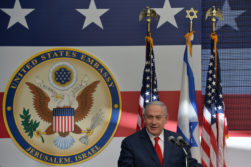
PM Netanyahu addresses ceremony marking opening of US Embassy in Jerusalem. Illustrative.
Photo courtesy of Kobi Gideon / GPO
The opposition to United States President Donald Trump’s “Deal of the Century” peace plan has been spreading around the world in recent days, but time and again that rejection has been tepid, divided, or undercut. European Union Foreign Policy Chief Josep Borrell Tuesday added his criticism of the proposal, but his position was reportedly not endorsed by the EU itself. Meanwhile, the Arab League also rejected the peace plan—which has conditions allowing for the creation of a Palestinian state while acknowledging Israeli sovereignty over the strategic Jordan Valley and the Israeli communities in Judea and Samaria some call “settlements”—but the overall Arab opposition was watered down.
Even the African Union Chairperson’s decision to decry the plan was in stark contrast to the Israel-welcoming actions of two African nations one day after the Union’s decision.
The EU situation was perhaps the most divided, as Israel’s Ynet Hebrew news reported that Borrell was pushing for the EU to publicly oppose the plan. Instead, an effort by Israel’s Foreign Ministry convinced six European nations—Austria, Bulgaria, the Czech Republic, Hungary, Italy and Romania—to reject Borrell’s statement while other nations were hesitant. As a result, the ostensible EU Foreign Policy Chief had to attack the peace plan on his own.
Borrell, in a statement posted to the EU External Action website, claimed that Trump’s Deal of the Century “departs” from “internationally agreed parameters”. The territorial parameters, according to Borrell, are effectively a Palestinian wishlist: the borders as they were in 1967 with equivalent land swaps. Borrell even went so far as to threaten Israel against applying sovereignty to territory the Trump plan acknowledges as Israel’s, saying such a move “could not pass unchallenged.”
Israeli Foreign Ministry spokesman Lior Haiat reacted strongly to Borrell’s statement. On Twitter, Haiat wrote in a series of posts, “The fact that the High Rep of the EU, Josep Borrel, chose to use threatening language towards Israel, so shortly after he assumed office & only hours after his meetings in Iran, is regrettable &, to say the least, odd. Pursuing such policies & conduct is the best way to ensure that the EU’s role in any process will be minimized.”
In a different area of the world, Axios reported that the Arab League foreign ministers issued a statement rejecting the Trump peace plan as insufficient for Palestinians. However, the same report also noted that direct criticism of the plan was lacking from nearly all of the speeches by individual foreign ministers, while three Arab states even said it could be a starting point in Israel-Palestinian negotiations.
Finally, the Chairperson of the African Union Commission, Moussa Faki Mahamat, said in a statement posted to the Commission’s website that the Deal of the Century “ignores” Palestinian rights and was developed without Palestinian input. He conveniently left out that the Palestinians rejected the plan without even seeing it—removing themselves from the process—and that the plan would award the Palestinians with a state of their own if certain conditions were met.
Yet one day after the Chairperson’s rejection of the peace plan seen as too supportive of Israel, two members of the African Union met with Israeli Prime Minister Benjamin Netanyahu and hinted at growing relations with the Jewish state.
A press release from Netanyahu’s office quoted Uganda President Yoweri Museveni as saying about opening an embassy in Jerusalem, “If a friend says, I want your embassy here, rather than there, I don’t see why it wouldn’t be. We are studying that.”
While in Uganda, Netanyahu also met with the Chairman of the Sovereignty Council of Sudan, Lieutenant General Abdel Fattah al Burhan. According to an Israeli press release, normalization of relations between Israel and Sudan—a Muslim nation—was discussed.
Even if normalization doesn’t progress, Israeli Ambassador to the United Kingdom Mark Regev summed up the significance of the meeting on Twitter: “53 years ago: the Arab League declared from Sudan: ‘NO peace with Israel, NO recognition of Israel, NO negotiations with Israel.’ 53 years on: Israeli and Sudanese leaders meet. Our growing ties with the Arab world prove the obsolescence of anti-Israel rejectionism.”
That Israel continues to have hope for better relations with its neighbors was also expressed on Tuesday by Israeli President Reuven Rivlin. In comments published by an Israeli press release, Rivlin said of the Trump peace plan: “The vision for peace which President Trump presented last week recognizes Israel’s need to retain security responsibility for all areas west of the Jordan River. Israel must always be able to defend itself by itself. Yet, while we will never compromise the security of our citizens, I believe that a vision of peace with our Palestinian neighbors is a realistic one.
“Israelis and Palestinians are not doomed to live together, it is our destiny to live together. I hope that both sides will take this opportunity to restart direct negotiations.”
(By Joshua Spurlock, www.themideastupdate.com, February 4, 2020)
